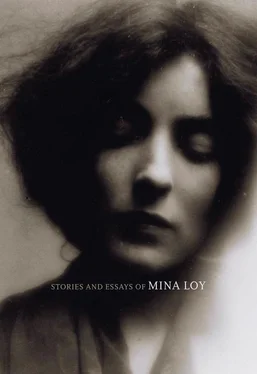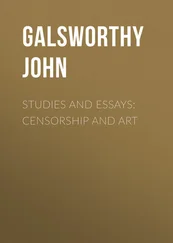Mina Loy - Stories and Essays of Mina Loy
Здесь есть возможность читать онлайн «Mina Loy - Stories and Essays of Mina Loy» весь текст электронной книги совершенно бесплатно (целиком полную версию без сокращений). В некоторых случаях можно слушать аудио, скачать через торрент в формате fb2 и присутствует краткое содержание. Год выпуска: 2011, Издательство: Dalkey Archive Press, Жанр: Современная проза, на английском языке. Описание произведения, (предисловие) а так же отзывы посетителей доступны на портале библиотеки ЛибКат.
- Название:Stories and Essays of Mina Loy
- Автор:
- Издательство:Dalkey Archive Press
- Жанр:
- Год:2011
- ISBN:нет данных
- Рейтинг книги:3 / 5. Голосов: 1
-
Избранное:Добавить в избранное
- Отзывы:
-
Ваша оценка:
- 60
- 1
- 2
- 3
- 4
- 5
Stories and Essays of Mina Loy: краткое содержание, описание и аннотация
Предлагаем к чтению аннотацию, описание, краткое содержание или предисловие (зависит от того, что написал сам автор книги «Stories and Essays of Mina Loy»). Если вы не нашли необходимую информацию о книге — напишите в комментариях, мы постараемся отыскать её.
Stories and Essays of Mina Loy
Stories and Essays of Mina Loy — читать онлайн бесплатно полную книгу (весь текст) целиком
Ниже представлен текст книги, разбитый по страницам. Система сохранения места последней прочитанной страницы, позволяет с удобством читать онлайн бесплатно книгу «Stories and Essays of Mina Loy», без необходимости каждый раз заново искать на чём Вы остановились. Поставьте закладку, и сможете в любой момент перейти на страницу, на которой закончили чтение.
Интервал:
Закладка:
He was one of those rare beings born to greatness, who see the world lying spread around them like an open gold-mine. Unlike the average man who sees nothing beyond his appointed pigeon-hole in which he hopes, by virtue of obedience to be allowed to remain safe “in that state to which it hath pleased God to call — —”
Ian Gore was also born to be a great man. He first came to understand this when he discovered how infinitely more potential was the margin of his Latin verse, than the text. His hand and eye were also marvellously dexterous. He knew himself to be a draughtsman, and also that to mature his genius he must live upon a barge.
Mr. and Mrs. Gore had only one son to offer on the altar of society. This son refused. He wanted to revert to the beefy foul-tongued leading of a manly life; to drink beer with the husky dregs of a population. To limn souls that were not smeared over, smoothed out, made unrecognisable to the creator by the footling ritual of civilization. He did not care who, what, a man was. All he asked of him was to have “form,” chunks of form, that the strong eye might wrestle with and master. The impulse of his art was to define volume.
His father pleaded, he would, “at least” — — — — He insisted — — “first study art.” Ian consented, after his inspection of an art school had suggested itself to him as a likely place for his initial rehearsals of “frightening good form to death.”
+
In the meantime the more puny son of the criminal world had also conceived his ideal. An ideal so startling, so incompatible with the possibilities on his horizon, that he alone of the three, had it not been for an accident, would have stood a chance of failure.
Hyde Park Hinderman’s desire was towards conformity. He yearned to prop himself against the pillars of society, in time to delicately detach himself and become one of such pillars himself. He was convinced that criminals were not good form. He longed for approval. In other words he was a snob.
It all began with his respectful admiration for a policeman’s helmet. When he arrived at a definition of the exact adjustment between his parents’ social status and the policeman’s, there took place in him the spontaneous evolutionary modification of the parental type, so usual in the imaginative young.
He hung about the mission house, felt happy if he got patted on the head, and read their books. He was a pretty boy, with large blue eyes, a mixture of his father’s grey blank ones, and the vague velvety black pansy ones of his decoying Mamma. An air of innocence was thus arrived at. The mission house felt itself to be in a responsible position.
His father said the boy had a white liver.
His mother was in awe of him. Somebody had once told her, “the child would be a judgement on her.”
He would pore over the books from the mission house and then nag his parents about mending their ways. He tried to convince them that people didn’t do these things. Sometimes he would cry on his mother’s breasts — “We’re outcasts, outcasts”! She was like a deaf woman in a church.
Her husband would roar
“The bloody brat! Bitin’ the ’and wot fed ’im. ’Ere we’ve bin all these years slavin’ our lives out an’ wot for I’d like ter know? To give ’ im a persishun— Ain’t ’e allers lived in luckshery? Round the swell pubs with his curls an’ lace collars an’ orl?
“Wot’ud ’is poor great grand-pa say I dun . If ’e could only turn in ’is grave and see ’im now.
“ ’ E was ’ung, that’s what ’e was me boy in them days when they ’ung yer fer ’orse-stealin’ ’e was. We got our pride, fumerly pride an’ we don’t make no mays aliongsez. Yer Ma’s pa was the best safe-blower wot never was!
“An’ ’ere’s our own child, our only child we ’as bin lavishin’ on. Our own ’Ide Park. Cottinin’ on to the mission-house. Kissin’ cops I shouldn’t wonder! Gawd, it’s more than a decent man can stand. Servile, that’s what ’e is, servile. It’s orfal ’avin’ to say it of yer own son, servile!
“You’d let a lot of Toffs get away with Everythink ! And let them keep it! Without as much as a thankye to yer.
“Jus’ becorse they sing when they talks!
“Where’s yer brains? Where’s yer sense er justice? Where’s yer self-respec’?
“Can’t yer stand up in a fair fight an’ take wot comes ter yer?
“Lor’ blimme, yer might a bin born of a bank clerk! A bank clerk wot passes the cashier’s safe, hevery day of ’is life, swelp me God, an’ dies in the poor ’ouse, without a word of complaint.
“Ain’t yer got no sense o’ right nor wrong?
“Why I suppose if the Lord Mayor O’Lunnon left ’is front door open yer’d walk straight up an’ ring the bell. Wouldn’t yer now?
“Aow — don’t cry, yer daddy didn’t orter a’ said so much. I didn’t mean ’arf of it. There, me own lad, kiss as many cops as yer like. ’Taint nothing serious. You’ll get all right, s’soon as yer voice breaks.”
“I’m cryin’, perpa,” sobbed Hyde Park Hinderman, “Cause yer is a bad man.”
This wilful misinterpretation of his reprovals exhausted the able burglar’s compassion. He lifted his offspring by the seat of his pants, and chucked him downstairs.
+
The mission house and The Society for The Prevention of Cruelty to Children (all this society’s wards are children who fail to reform their parents) took up this case.
Very little could have been done however, had it not been for that accident which was to help young Hyde in his laudatory design. The cops at last “got” his Pappa and Mamma and their sentence was for so long that it was hardly worthwhile for the son to wait for them to come out.
The mission house took him, and the mission house watched, how every day his eyes grew more innocent, his lashes pointed straighter up to heaven.
+
Mrs. Switheringham Bates first noticed him hanging round the preparation of lilies for the altar in the little chapel. She asked his history.
“Sad, sad,” she said. A childless widow, she had often wished to adopt just such a pair of eyes as these.
“Criminals you say, dear me!” It was most annoying. “Criminals.”
“And what,” she asked Hyde some weeks later on another of her visits of charity. “What gave you the idea, er, what made you long — ”
“How long?” enquired Hyde willingly.
“I mean, what made you feel you would like to become converted?”
The child puzzled himself for awhile.
“I know,” he answered brightly, “it was that orfal stale smell in the pubs.”
“But what do you want to do — with your Life — Have you thought? ”
“Oh mam, I want, I do so want to be good.”
“Why?” asked Mrs. Bates suspiciously.
“Cause everybody what is anybody, anybody wot don’t get chased around is .”
This revelation of “goodness” surprised her into pondering deeply within herself; she was forced to admit it coincided with her own conception, exactly.
“And when you were good, what would you do then?”
“Make everybody what isn’t good, good too,” said Hyde staunchly.
“Why?” asked Mrs. Bates, almost threatening him.
“I want,” said the boy, spreading wide his arms, “to make the whole world smell of flowers.”
“Why?” snapped Mrs. Bates again.
“Cause,” said Hyde Park ecstatically, “It would be same as here. An’ I like it. I liii-ke it!”
“That boy,” she remarked later, “has the most beautiful instincts.”
“We begin to believe,” said the parson, “that he has the vocation.”
Читать дальшеИнтервал:
Закладка:
Похожие книги на «Stories and Essays of Mina Loy»
Представляем Вашему вниманию похожие книги на «Stories and Essays of Mina Loy» списком для выбора. Мы отобрали схожую по названию и смыслу литературу в надежде предоставить читателям больше вариантов отыскать новые, интересные, ещё непрочитанные произведения.
Обсуждение, отзывы о книге «Stories and Essays of Mina Loy» и просто собственные мнения читателей. Оставьте ваши комментарии, напишите, что Вы думаете о произведении, его смысле или главных героях. Укажите что конкретно понравилось, а что нет, и почему Вы так считаете.












